
Have you ever heard the saying, 'A smile is worth a thousand words'? Well, the same goes for your furry companion. When it comes to your dog's oral health, brushing their teeth is more than just a grooming task – it's a vital step towards ensuring their overall well-being.
But why is it so important, you may wonder? In this discussion, we will uncover the benefits of brushing your dog's teeth and how it can keep their smile healthy. From preventing dental problems to saving you from expensive vet bills, this simple habit will not only leave your pup with a sparkling smile but also give you peace of mind.
So, are you ready to discover the secrets of maintaining your dog's dental health?
Key Takeaways
- Regular teeth brushing should be included in a dog's grooming regimen to prevent dental issues and maintain oral hygiene.
- Brushing dog teeth at home can help avoid costly veterinary treatments for dental problems.
- Supplies needed for brushing dog teeth include dog toothpaste, toothbrushes, and finger toothbrushes.
- Incorporating teeth brushing into a daily routine and providing hard toys or bones to chew on can help maintain dental health in dogs.
The Importance of Dog Dental Care
Taking care of your dog's dental health is crucial for their overall well-being and can save you time, money, and stress in the long run. Dental problems are common in dogs, such as loose and abscess teeth. That's why it's important to include regular teeth brushing in your dog's grooming regimen.
By brushing your dog's teeth, you can help prevent dental issues and maintain their oral hygiene. Dogs that have dental problems may require costly veterinary treatment, but by properly cleaning their teeth at home, you can avoid those expensive vet bills. All you need are some supplies like dog toothpaste, a toothbrush, and finger toothbrushes.
To brush your dog's teeth, lift their upper lips and brush in a circular motion. Pay attention to the back teeth and repeat the process for the bottom set of teeth. By incorporating teeth brushing into your daily routine and providing hard toys or bones to chew on, you can help maintain your dog's dental health and prevent issues like bad breath, tooth loss, and gum disease.
Not only will brushing your dog's teeth contribute to their overall health, but it will also be a positive experience for them with flavored toothpaste. So start taking care of your dog's dental health today and save yourself time, money, and stress compared to vet visits.
Preventing Dental Issues in Dogs
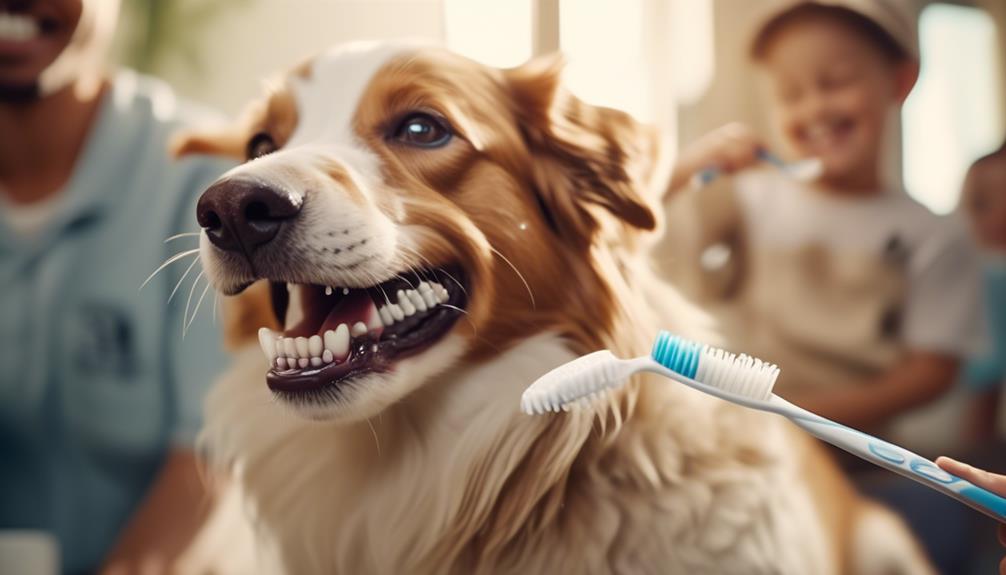
To prevent dental issues in your dog, it's important to establish a regular dental care routine. Here are three key steps to help you keep your pup's teeth healthy:
- Brush your dog's teeth regularly: Use a dog-friendly toothbrush and toothpaste to brush your dog's teeth at least 2-3 times a week. Make sure to brush in a circular motion and pay attention to the back teeth.
- Feed dental-friendly food: Incorporate dry dog food or hard biscuits into your dog's diet. These foods help reduce plaque build-up and maintain oral hygiene.
- Provide chew toys or dental treats: Giving your dog hard toys or bones to chew on can help keep their teeth clean and strong. Look for toys specifically designed to promote dental health.
Cost Savings With Regular Teeth Brushing
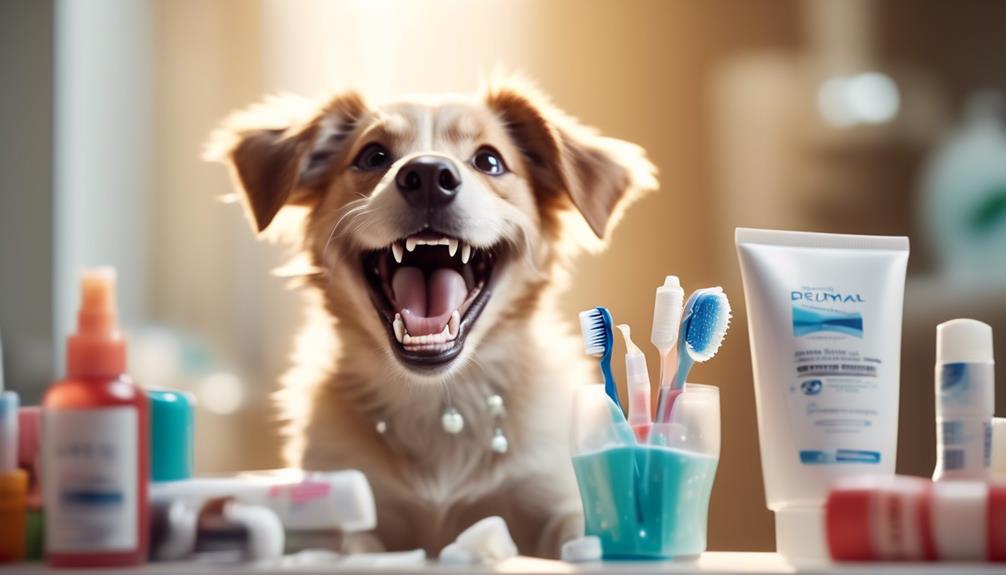
Regular teeth brushing for your dog can lead to significant cost savings in the long run. By incorporating teeth brushing into your dog's daily routine, you can prevent dental issues and avoid costly vet visits.
Dental problems in dogs, such as loose and abscess teeth, can require expensive veterinary treatment. However, with proper teeth cleaning at home, you can maintain your dog's oral hygiene and reduce the need for professional cleanings. Supplies like dog toothpaste, toothbrushes, and finger toothbrushes are all you need to get started.
Brushing your dog's teeth in a circular motion and paying attention to the back teeth will help prevent bad breath, tooth loss, and gum disease. By investing a little time and effort in regular teeth brushing, you can save both money and stress in the long term.
Essential Supplies for Brushing Dog Teeth
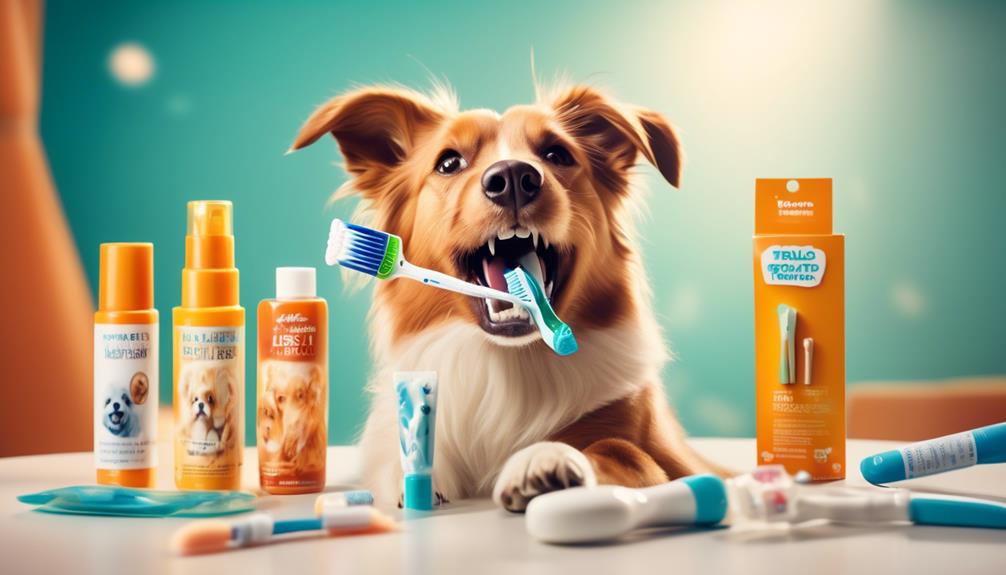
By ensuring you have the necessary supplies, you can easily incorporate regular teeth brushing into your dog's grooming routine. Here are the essential supplies you'll need:
- Dog toothpaste: Use toothpaste specially formulated for dogs, as human toothpaste can be harmful to them. Dog toothpaste comes in a variety of flavors to make the experience more enjoyable for your pup.
- Toothbrush: Get a toothbrush designed for dogs, with soft bristles and a long handle for easy reach. You can choose between a regular toothbrush or a finger toothbrush, depending on your dog's preference and size.
- Finger toothbrushes: Finger toothbrushes are a great alternative to regular toothbrushes, especially for dogs who aren't comfortable with a brush in their mouth. They fit over your finger and allow for better control during brushing.
With these supplies in hand, you'll be well-equipped to start brushing your dog's teeth and keeping their smile healthy.
Step-by-Step Guide to Brushing Dog Teeth
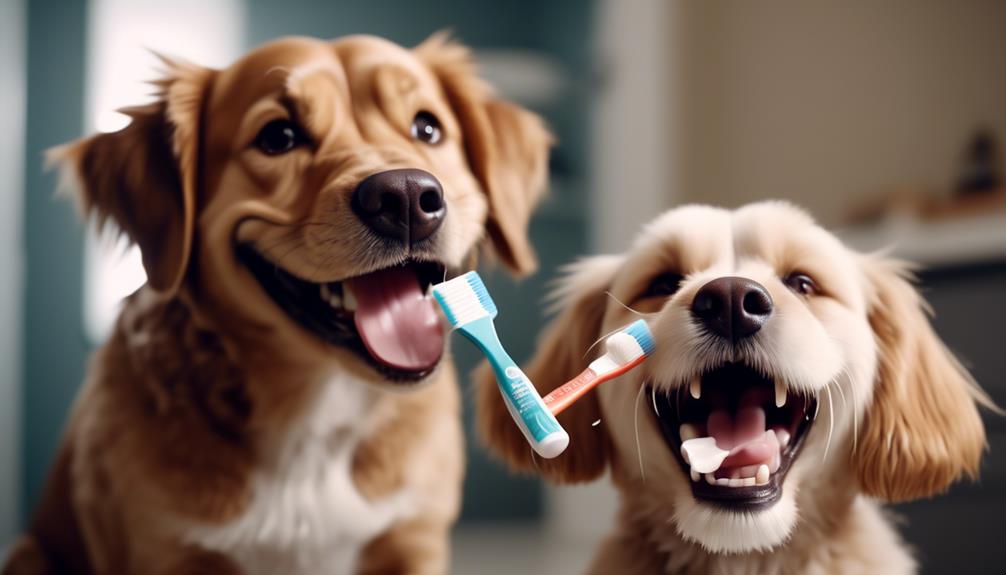
Start the process of brushing your dog's teeth by gently lifting their upper lips. This will allow you to have a clear view of their teeth and gums. Once their lips are lifted, take a soft-bristled toothbrush or a finger toothbrush and apply a small amount of dog toothpaste.
Use a circular motion to brush their teeth, focusing on the outer surfaces. Be sure to pay special attention to the back teeth, as these are often neglected and prone to plaque buildup. Once you have brushed the upper teeth, repeat the process for the bottom set of teeth.
Remember to be patient and gentle, as dogs may be resistant to having their teeth brushed at first. With regular brushing, you can keep your pup's smile healthy and prevent dental issues.
Incorporating Teeth Brushing Into Daily Routine
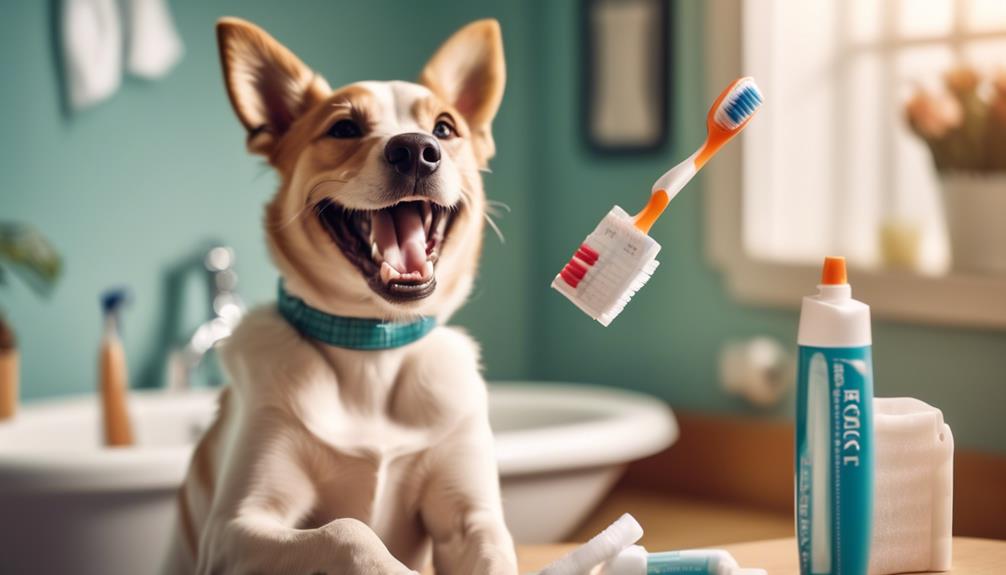
To seamlessly incorporate teeth brushing into your daily routine, make it a habit to gently lift your dog's upper lips as a starting point for maintaining their oral hygiene. Here are three simple steps to help you incorporate teeth brushing into your daily routine:
- Set a designated time: Choose a time that works best for you and your dog, whether it's in the morning or before bedtime. Consistency is key to establishing a routine.
- Use positive reinforcement: Make teeth brushing a positive experience for your dog by using flavored toothpaste and offering rewards or praise. This will help them associate brushing with something enjoyable.
- Be patient and gentle: Take your time and be gentle when brushing your dog's teeth. Start with short sessions and gradually increase the duration as your dog becomes more comfortable.
Feeding Habits for Dental Health
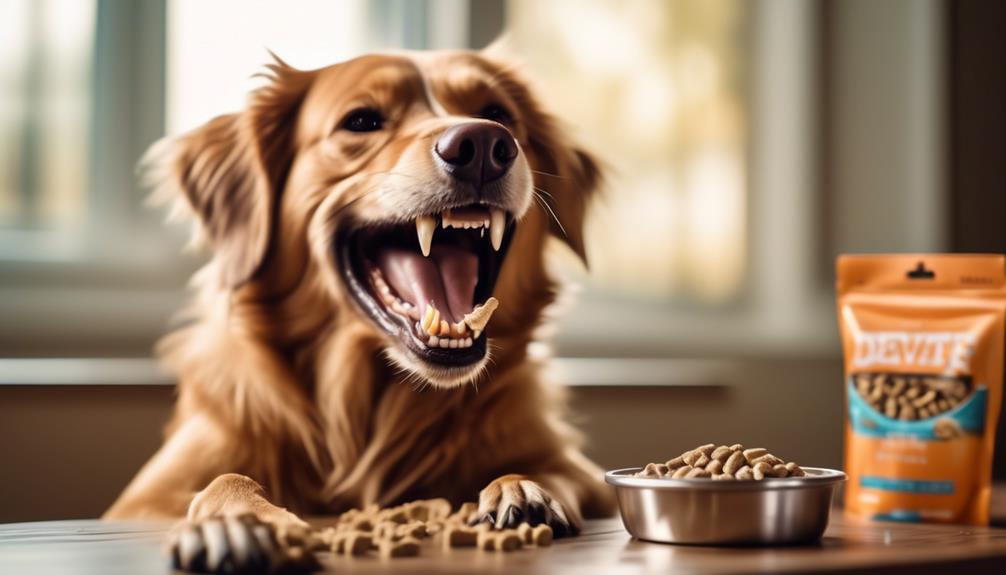
Incorporating a dental-friendly diet is crucial for maintaining your dog's oral health. What you feed your dog can have a significant impact on their dental health.
Opt for high-quality dog food that's specifically formulated to promote dental health. Look for options that are designed to reduce plaque and tartar buildup.
Feeding your dog dry kibble instead of wet food can also help clean their teeth as they chew. Additionally, incorporating dental treats or toys can provide your dog with extra chewing opportunities, which can help remove plaque and keep their teeth clean.
Remember to consult with your veterinarian to determine the best diet for your dog's specific needs. By paying attention to your dog's feeding habits, you can contribute to their overall oral health and prevent dental issues down the line.
Providing Chew Toys for Oral Hygiene
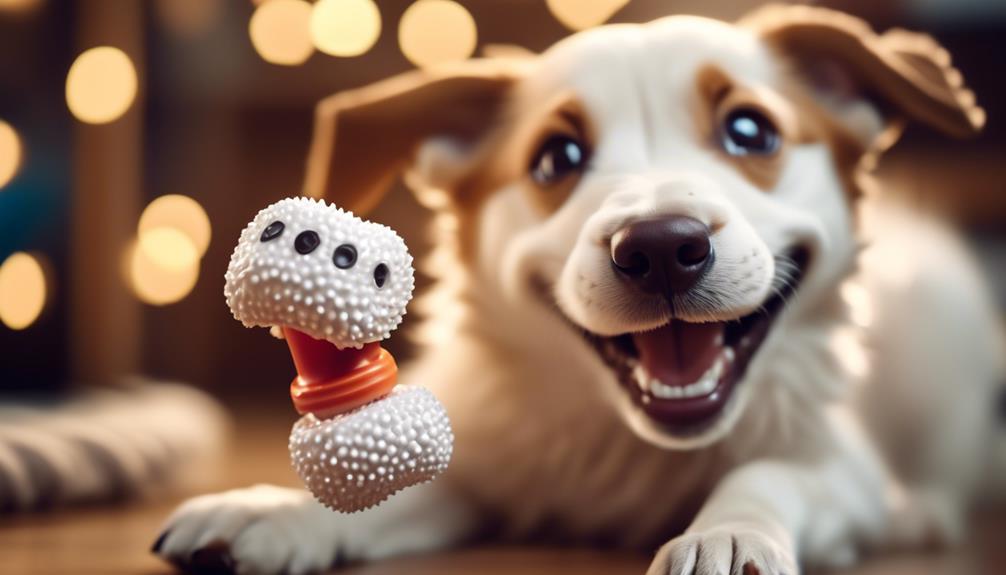
Consider providing chew toys as an effective way to promote oral hygiene for your dog. Chew toys not only provide entertainment and mental stimulation for your pup, but they also have several benefits for their dental health.
Here are three reasons why chew toys are important for oral hygiene:
- Plaque and tartar control: Chewing on toys helps remove plaque and tartar buildup, which can lead to gum disease and tooth decay. The texture of the toys helps scrape away the plaque, keeping your dog's teeth clean and healthy.
- Exercise for jaw muscles: The act of chewing on toys helps strengthen your dog's jaw muscles. This can prevent dental issues such as loose teeth and jawbone deterioration.
- Stress relief: Chewing on toys provides a natural way for your dog to relieve stress and anxiety. By redirecting their chewing behavior to toys, you can prevent them from damaging furniture or other household items.
The Benefits of Flavored Dog Toothpaste
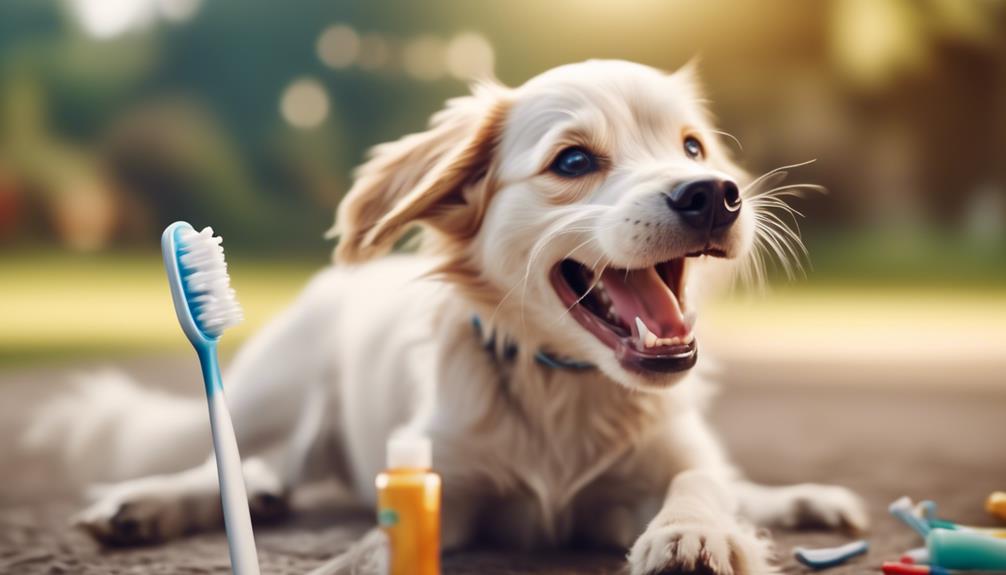
Flavored dog toothpaste offers a tasty and enjoyable way to maintain your dog's oral hygiene. Not only does it make the brushing experience more pleasant for your pup, but it also provides several benefits.
Firstly, the delicious flavors, such as chicken or peanut butter, can help to entice your dog to willingly participate in teeth brushing. This can make the process easier and more enjoyable for both of you.
Additionally, flavored toothpaste can help freshen your dog's breath, which is especially important if you enjoy close interactions with your furry friend.
Lastly, by using flavored toothpaste, you can ensure that your dog's teeth are properly cleaned and free from plaque and tartar buildup, reducing the risk of dental issues and potential costly vet visits.
Protecting Against Tooth Loss and Gum Disease

To protect your dog's teeth and gums from potential issues such as tooth loss and gum disease, it's important to establish a regular teeth cleaning routine. Here are three reasons why this is essential:
- Prevent Tooth Loss: Regular brushing helps remove plaque and tartar buildup, which can lead to tooth decay and eventually tooth loss. By keeping your dog's teeth clean, you can help preserve their natural teeth and prevent the need for extractions.
- Reduce the Risk of Gum Disease: Gum disease is a common problem in dogs and can lead to pain, infection, and even systemic health issues. Brushing your dog's teeth helps remove bacteria that can cause gum disease, keeping their gums healthy and reducing the risk of complications.
- Maintain Overall Oral Health: A regular teeth cleaning routine not only prevents tooth loss and gum disease, but also contributes to your dog's overall oral health. By keeping their teeth and gums clean, you can ensure they have a healthy and happy smile for years to come.
Time, Money, and Stress Saved With Home Dental Care
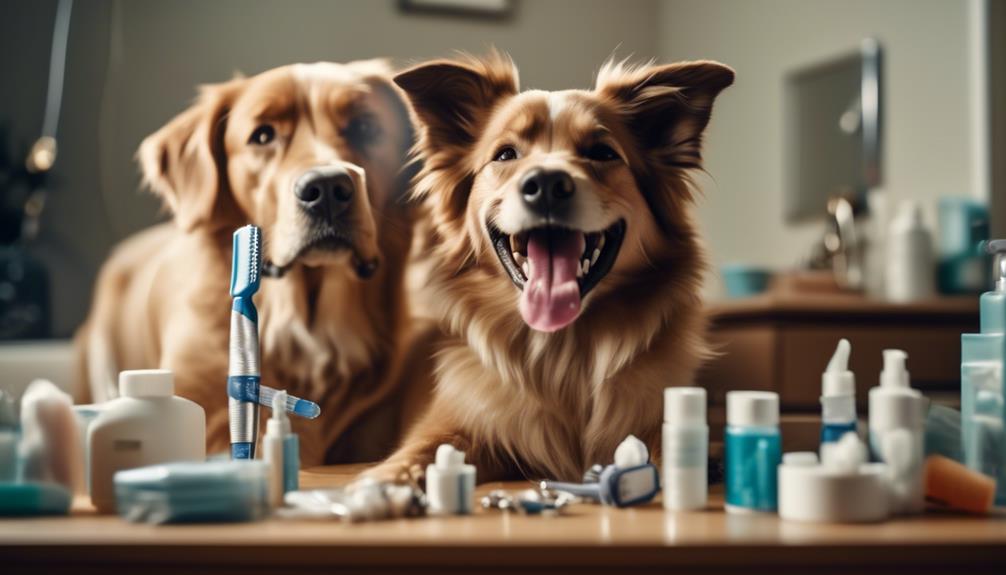
Establishing a regular teeth cleaning routine not only protects your dog's teeth and gums, but it also saves you time, money, and stress with home dental care.
By taking the time to brush your dog's teeth regularly, you can prevent dental issues and maintain their oral hygiene. This means fewer visits to the vet for costly treatments.
With just a few supplies like dog toothpaste and a toothbrush, you can easily incorporate teeth brushing into your daily routine. Feeding your dog dry food or hard biscuits and providing them with hard toys or bones to chew on can also help maintain their dental health.
Frequently Asked Questions
Can I Use Regular Human Toothpaste to Brush My Dog's Teeth?
No, you should not use regular human toothpaste to brush your dog's teeth. It contains ingredients that can be harmful to dogs. Use toothpaste specifically made for dogs to ensure their dental health and safety.
How Often Should I Brush My Dog's Teeth?
You should brush your dog's teeth at least 2-3 times a week. Regular brushing helps prevent dental issues and maintain oral hygiene. It saves you time, money, and stress compared to vet visits.
Is It Necessary to Brush My Dog's Teeth if They Are Already Eating Dry Dog Food?
Yes, it is necessary to brush your dog's teeth even if they are already eating dry dog food. Regular teeth brushing helps prevent dental issues and maintain oral hygiene, saving you time, money, and stress in the long run.
Can I Use a Regular Toothbrush to Brush My Dog's Teeth?
Yes, you can use a regular toothbrush to brush your dog's teeth. It's important to choose a soft-bristled toothbrush and use dog-specific toothpaste. Regular brushing helps maintain your dog's oral hygiene and prevents dental issues.
Are There Any Alternatives to Brushing My Dog's Teeth for Maintaining Their Dental Health?
There are no alternative methods to brushing your dog's teeth for maintaining their dental health. Brushing is the most effective way to prevent dental issues and save money on vet bills.
Conclusion
In conclusion, by regularly brushing your dog's teeth and providing proper dental care, you can ensure their oral health and prevent dental issues. Not only does this save you from expensive vet bills, but it also promotes your dog's overall well-being.
With the right supplies, technique, and flavored toothpaste, brushing your dog's teeth can be an enjoyable experience for both of you. By incorporating this simple habit into your routine, you can save time, money, and stress while keeping your pup's smile healthy.




